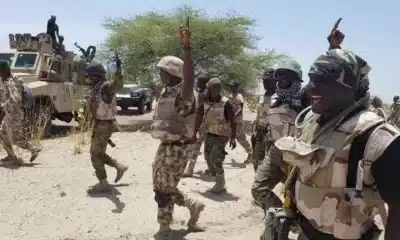Nigeria News
Court Exonerates 888 Suspected Terrorists

A total of 888 individuals accused of having links to terrorism have been released and acquitted by the court due to insufficient evidence, among other factors, as reported by the federal government.
The government indicated that there have been 1,743 cases prosecuted from phase 1 to phase 6 of terrorism trials conducted at the Kainji detention facility since 2017.
During a press briefing in Abuja on Monday, the Director of Public Prosecution of the Federation, Mohammed Abubakar Babadoko, informed journalists that 92 trials have been postponed.
Naija News understands that over 200 suspects associated with terrorist activities across various regions of the country had been convicted in phase 6 after being found guilty of their charges.
In detailing the prosecutions and convictions, Babadoko emphasized that the current administration has made significant efforts to combat terrorism in the country by resuming the trials of suspects previously suspended.
He said, “In October 2017, 50 were convicted; 203 were discharged and acquitted; 28 were adjourned. In February 2018, 203 were convicted, 582 were discharged/acquitted, and 24 were adjourned.
“In July 2018, 113 were convicted, 102 were discharged/acquitted, and 9 were adjourned. In December 2023, 14 were convicted; 1 was acquitted; 10 were adjourned.
“In July 2024, 125 were convicted; none were acquitted, and 21 cases were adjourned. In December 2024, 237 were convicted; none were acquitted, and no cases were adjourned.
“Some of these cases involved acts of terrorism, terrorism financing, and other criminal activities, for which some defendants were sentenced to terms of imprisonment ranging from 60 years to life imprisonment.
“It’s important to note that within the last year, during this administration, about 515 cases were disposed of, and over 800 individuals—whom we call clients, those who have served terms or were discharged/acquitted at various stages of trial—were moved to Operation Safe Corridor in Gombe for rehabilitation and reintegration, in accordance with the orders of the court and the policy of the federal government.”
In his separate remark, the Director of Legal Services at the Office of the National Security Adviser, Zakari Mijinyawa, indicated that individuals suitable for deradicalisation are those who have not been deemed guilty of any offence by the criminal justice system.
He said, “So, if there is evidence and you go through the trial and are convicted, you serve your sentence. The whole process of Operation Safe Corridor and the DDRR (Disarmament, Demobilization, Reintegration, and Rehabilitation) is for those whom the court has found not suitable for prison.
“This is important information that should be widely known across the country. The media should help in spreading this message. The DDRR process includes psychological evaluations, family reunifications, mental health support, and economic intervention.”
Meanwhile, the Coordinator of the National Counter-Terrorism Centre, Major General Adamu Laka, reflected on the significant terrorist attack that occurred on Nigeria’s Independence Day, October 1, 2010, in Abuja, marking it as one of the initial major incidents of terrorism in the country.
He noted that subsequent to this event, there was a surge in attacks, including those targeting the United Nations building and the police headquarters in Abuja, executed by Boko Haram under the leadership of Abubakar Shekau.
Laka also mentioned that a collaborative team of pertinent stakeholders from various Ministries, Departments, and Agencies (MDAs) participated in the mass trial.
“These included judges of the Federal High Court, prosecutors, defence counsel from the Legal Aid Council of Nigeria, staff of the Office of the National Security Adviser, observers from the Nigerian Bar Association, and the press,” he added.












